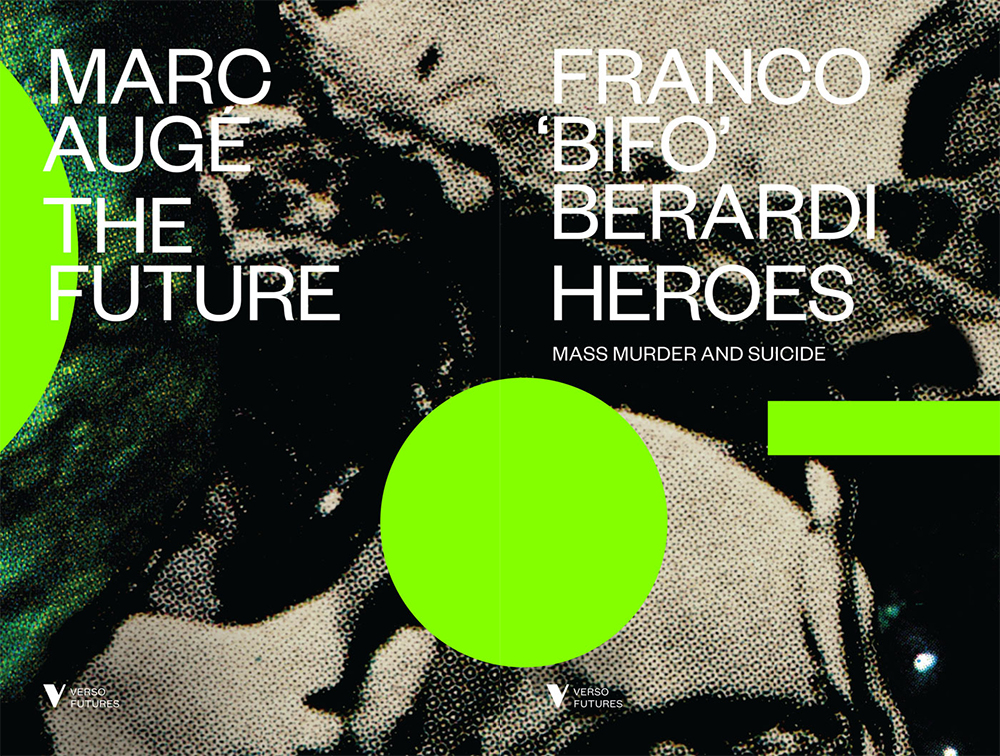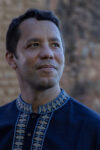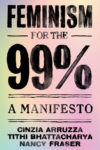These days it’s not strange to hear discussions of impending catastrophe in polite company (or serious company for that matter), the inchoate idea that a general dissolution is right around the corner. Or, supposing we are in a more fatalistic mood, the conversation might turn to rummaging around the past to pinpoint the animating event that kicked off the whole process, whose logic we are consigned to watch unfold before our eyes. These kinds of conversations are not the political hysterics of the culture wars, nor the critique of the dark underside of mid-century optimism. Rather they speak to the cumulative effect of fears and anxieties that circulate around the media, a proliferation of bad news on the global scale without the commensurate strength (of imagination or volition) to do anything constructive with these bits of narrative.
As Marc Augé argues in The Future, a contribution to the newly inaugurated “Verso Futures” series, the spirit of these discussions, no matter what we make of the content, is a problem for democratic life. “Technological innovations,” he writes, “exploited by financial capitalism have replaced yesterday’s myths in the definition of happiness for all, and are promoting an ideology of the present, an ideology of the future now, which in turn paralyses all thought about the future.” If we can’t give the future a little breathing room from the ever shrinking present, then enlightenment ideals like personal and collective autonomy don’t stand a chance.
Despite the broad implications of this statement, Augé’s concerns are subtle and convincing in their selection. He is well known for his concept of the “non-space,” the skein of malls, highways, office parks — generic spaces of circulation, communication, and consumption — that knits together the social fabric in an age oversaturated with information. However, they do so in a way that welcomes the grand narratives of the present like Debt, Crisis, Consumerism, and Austerity/Recession. We are globalized and networked in transformative ways, but for this to be a source of hope instead of one of fear we need an infrastructure upgrade, one that includes an education that allows us to re-inject intelligence and knowledge into those non-spaces.
As an eminent ethnologist (an Africanist by training), Augé is well aware of the difficulties in this project, primarily because of the way myths are generated out of and circulate through this shrunken present. Take for example the current fetishization of “innovation,” present since the headfirst dive into our technological future by mid-century optimists (in 1969 the philosopher John McDermott suggested that “laissez-faire” was giving way to “laissez-innover,” carrying the political, social, and ethical reductions of free market economics into new arenas). Collaboration, interdisciplinarity, disruption, tech transfer, open design office spaces — such are the themes that are meant to preserve the future as a space of hope. They might be successful were they not equally, as Augé argues, themes that “perhaps function as a reduced metaphor for social life,” leading us to “wonder whether we are in the presence of a vast scheme of substitution, changing the meanings of the terms ‘research,’ ‘diversity,’ and ‘cooperation’; we may wonder if the world of business might not have substituted itself for the world proper.” Here the ethnographer steps in to remind us that this is essentially a powerful and often incredibly disquieting form of magic. “Systematic use of words whose meanings one has not mastered, the mechanical repetition of ready-made formulae, are behaviors that characterize magic. And the ability of the media to impose them and spread them across the planet in a few days is terrifying.”
It’s not hard to find these sources of magic in universities, in think tanks, or in the financial pages, and their pufferfish-like ability to numb our imaginative and critical faculties is truly a concern. However, the sting of this hollow present is felt most acutely in our emotional life, a point driven home by Franco ‘Bifo’ Berardi in Heroes, also a contribution to the Verso Futures series. His subtitle — Mass Murder and Suicide — points towards another space of “metaphorical density,” though unlike the magical incantations of the present that Augé discusses, these acts of spectacular and devastating violence proliferate not in speech, but in deed after seemingly inexplicable deed.
It was James Holmes, the graduate student who opened fire during an Aurora, Colorado screening of The Dark Knight Rises, that led Bifo to look deeper into one of the most distressing features of our present. The “heroes” of the title is obviously not an honorific. It refers to the generic function of heroes as being protagonists, or those that set the events of the plot in motion. “I write about spectacular murderous suicides because these killers are the extreme manifestations of one of the main trends of our age. I see them as heroes of an age of nihilism and spectacular stupidity: the age of financial capitalism.” Or again, “suicide is no longer a marginal phenomenon of isolated psychopathology, but is becoming a major agent of the political history of our time, and also the marker of an anthropological shift that planetary culture is unable to elaborate. Suicide offers, in my view, a crucial perspective on the history of the present.” Despite the grimness of the subject matter and the diversions into psychoanalysis, popular culture, and theology, I’m inclined to agree with Bifo that mass murder and suicide go a long way in explaining the despair and fearfulness of a present that makes the future painful or impossible to conceive. The admixture of precarity and competition in employment and education, the organized crime/fraud of the economy, and the ideology of extreme individualism cannot obtain for decades without producing these ugly effects.
Each book has a conclusion, offered in both cases more as a matter of charity to the reader than as a redemptive statement on the preceding gloom and disquiet. The differences are interesting and speak to a subtle generational shift between the soixante-huitards (Augé) and who we might call 77-ers (Bifo and his Autonomia bretheren).
As already mentioned, Augé sees the way forward in science and the collective, intelligent consideration of ends, as opposed to a generalized thoughtlessness and preoccupation with means and short-term solutions. Intelligence, rooted in the spirit of scientific inquiry, is the key. First, in following inquiry wherever it leads, science “produces forms of plot development which do not flow mechanically from what precedes them.” Furthermore inquiry requires an indeterminate amount of time, unbinding the future from the present. As he puts it, “The world in which we live teems with messages claiming to provide the key to the present by assessing the recent past (yesterday is already history) and the near future (tomorrow is already today). Are these expressions of truth or are they confecting, a little at a time, the mythology and ideology of the global world or which we are part?”
Augé sounds remarkably like John Dewey in his turn towards the importance of inquiry and education in the final chapters. However, unlike Dewey, who contemporaries charged with aloofness towards political trends (Randolph Bourne) and espousing a philosophy, pragmatism, that was easily absorbed into a pervasive ideology of technical rationality (Max Horkheimer), Augé has his critical faculties trained on the structural features of contemporary capitalism. As mentioned at the beginning of this review, the major problem with reviving the future as a live and interesting conceptual terrain is the conjunction of rapid technological development (especially in information technologies) and finance capitalism. Yet the ultimate arc of critique is towards the new, the unexpected, the possibility that exceeds the conceptual stock of the present, and here we find echoes of his generation (e.g. Rancière, Badiou, de Certeau). Science, or the adventure of seeking the true and the real once we, like the ethnologist, learn to “distrust the definite article” and imagine plural futures, is Augé’s variation on this theme.
Heroes suggests something different — irony — and here 1977 plays as important a role as 1968 does for an older generation. It “can be seen as the year of the passage beyond modernity,” the birth of punk and no-wave, the philosophical heyday of Deleuze, Baudriallard, Lyotard, Virilio, and the death of Charlie Chaplin (with his death “the last traces of human kindness seemed to disappear too.”). It brought the “occupation of social consciousness by the ubiquitous screen of television, the colonization of the unconscious and the competitive prevision of desire, the beginning of Neoliberal aggression,” but it also gave birth Autonomia, one of the most creative leftist projects of the post-war era. It is the “double-faced” nature of this year that makes a very dark form of irony the appropriate response to our current present/future pairing, one which can be traced back to 1977.
The penultimate chapter of Heroes takes us to South Korea, where Bifo reluctantly agreed to speak to a group of artists, scholars, and activists in 2012. We don’t often think of South Korea as a failed state, despite the fact that it has fitfully emerged from a history of colonization, dictatorship, and internal fracture — or more to the point, despite the fact that it pairs the 14th largest economy by GDP with the third highest suicide rate in OECD countries. But in many ways South Korea speaks to the exhaustion of the post-77 world, the confirmation of Thatcher’s assertion that there is no such thing as society, albeit with more consumer hedonism and LED screens than the Iron Lady would be comfortable with. Yet even here, “in a form of contemporary nihilism at its most advanced degree,” Bifo finds a group of activists named Sujonomo N, who through their various political, educational, cultural, and artistic activities confirm that “even in hell there are wonderful people and nice places to relax and have fun.” It’s the most banal of insights for such a densely packed work of political theory, but it’s important nonetheless. Irony “reminds us that the spectrum of the possible is much larger than the range of probability,” and thus that both increased political awareness and dreams of total revolution don’t move us anywhere new on their own. Irony is here the precondition of autonomy, but it has “tarried with the negative,” to lift a phrase from Hegel.
My alma mater is currently in the midst of a capital campaign, one that of course brought with it a new public relations push. The slogan they have adopted is “Where the Future Comes First” (this followed “Faster Forward,” the slogan of a rogue group of educational technologists (or “technological nihilists” as my co-workers at the circulation desk liked to put it) who have made significant headway in stripping the library of physical books). The slogan serves as a perfect exemplification of what Augé and Bifo are so concerned about, as it emerged at a time when both students and faculty had publicly registered their complaints about the administration’s aggressive style of corporate governance. The quality of scholarship and students had dropped precipitously, and it was hard to imagine a path back towards the legacy of social activism and academic rigor that once defined the college. Seeing “the future” marshaled by the administration as a response to the anxieties about the college’s direction really hemmed in the faculty and protesting students — either they suggest a constructive way to participate in this future or continue to squabble amongst themselves about problems of corporatization and betrayal of education and political mission. The slogan suggests that these two could be separated, and in the interest of preserving some sense of autonomy and shared governance everyone should prefer the former. This was of course a dodge — just as reducing mass killings to biographical, psychological, or social causes (e.g. playing violent video games) is a way to foreclose a more honest discussion of the structural violence and nihilism of finance capitalism. Neither Augé nor Bifo wants the future to be a dodge, and nor should we. Harping on the structural undoing of the social fabric, the welfare state, and our once renowned universities is important, but so is the question raised by these books — whether we recommit ourselves to the free play of inquiry or adopt a healthy and skeptical irony towards our own “solutions.” It’s a tough question to work out for oneself, especially when caught in the looming catastrophe that is on everyone’s lips, or often bewitched by the media’s conflation of events of historical depth and those that more easily recede into the non-spaces of our lives.
Michael Schapira is the Interview Editor for Full Stop.
This post may contain affiliate links.








